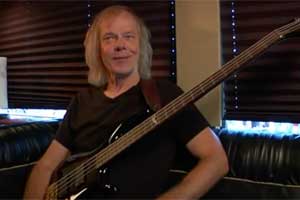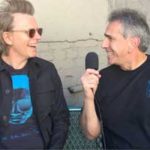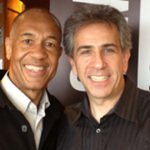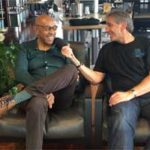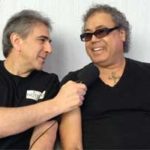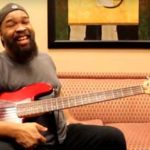Conversation with long-time “Weird Al” bass player, who is also a Grammy-winning recording artist and a prolific film scorer!
Exclusive interview with FBPO’s Jon Liebman
May 5, 2014
Stephen Jay is a bassist, composer, vocalist and multi-instrumentalist. Perhaps best known as bassist for “Weird Al” Yankovic for over thirty years, Stephen has also performed and/or recorded with Rick Derringer, Wayne Shorter, Hugh Masekela, Alex Acuna, Luis Conte and many others. Jay rose to national prominence in 1984 when he was voted one of “Today’s 20 Top Bassists” by International Musician and Recording World magazine (along with Mark King, Stanley Clarke, Jimmy Haslip, Chris Squire, Carol Kaye and John Patitucci, to name a few).
Stephen’s bass recording credits include three GRAMMY-winning and nine GRAMMY-nominated albums, as well as nine gold and five platinum albums. He has scored more than seventy nationally broadcast PBS specials and series episodes, including three George Foster Peabody Award winners, and has contributed to TV and feature films. Stephen’s bass and drum duo, “Ak & Zuie” has toured the U.S., Canada and Australia and has appeared on PBS.
FBPO: Tell me about your musical upbringing.
SJ: I was fortunate to be born into a musical family. My mom, Delphine, sang and taught piano, my father, Eugene, played harmonica, accordion and banjo and my older sister, Ellen, played classical guitar. I started piano at age 5 and began learning guitar from my sister and dad. Watching my family play and enjoy music was my first inspiration. I knew instinctively that I wanted to get to that place myself. Having been named after my mom’s favorite composer, Stephen Foster, I felt destined to be a composer from about the time I learned how I got my name.
FBPO: What was the musical environment like where you grew up in Central Florida?
SJ: Central Florida in the ’60s was a young musician’s dream come true. I happened to spend my childhood in a time and place that was very supportive of live music. Pop music was on fire and its influence was pervasive. “Louie Louie” by the Kingsmen had just woken us all up, then the British Invasion hit. Everyone seemed to be digging the same music at the same time. This made for an incredible array of venues filled with appreciative, paying audiences.
The junior high and high school youth centers, along with proms and homecomings, gave us plenty of places to play, where we could perform and earn money as kids. Later, the bars and clubs, sustained by the constant flow of tourists, and state laws, which required live music wherever alcohol was served, allowed us to continue playing. The relatively small number of musicians and bands in Central Florida at the time was a big factor in that – supply and demand.
FBPO: How did you become a bass player?
SJ: A friend in junior high was forming a band and asked me if I could think of a name for it. I asked if they needed anyone else in the band and his fateful reply was, “A bass player.” And that was it for me!
I had no gear at the time, so I did the first bunch of gigs sitting next to the drummer, playing bass parts on my unplugged classical guitar that no one else could hear. With no amp, I held the side of the body tight against my ear and grooved along with the band. That’s how I started learning bass, in my own little world, in public. After a while, my dad saw my plight, took me to Sears and bought me a Silvertone bass, with the amp built into in the case.
FBPO: Who were your influences when you first discovered the bass?
SJ: When I first discovered the bass, it was Bill Wyman, Pete Quaife, Paul McCartney and John Entwistle. As rock & roll bass was inventing itself, everything influenced me, but those were four who first stood as individuals. Later, I came to fully appreciate J.S. Bach as perhaps the original inventor and master of bass part composing in Western music. As is the case with many bass players, he continues to inspire me.
FBPO: How did your professional career get started? What types of gigs were you doing?
SJ: While I was in high school, the bands I was playing in kept getting better and better gigs, from doing shows with the “Allman Joys” – later the Allman Brothers – to opening for the Byrds, just as “Mr. Tambourine Man” was topping the charts. When I was a senior in high school, our band, Covington Tower, was signed to Athena Records. We placed second in a battle of the bands in Gainesville, Florida, which won us a chance to perform at the December 1968 Miami Pop Festival. That was just before Woodstock and included many of the same artists. Playing there at that age, with an estimated 100,000 in attendance, and hanging out backstage with those great musicians was absolutely life changing!
After that, we decided to stay together as a band and all go to the same college, USF (University of South Florida) in Tampa. The band only lasted another year, but I felt like I was on my way. I majored in composition, formed other bands and met my wife, Barbara, an artist, there in Tampa. We graduated and felt that our academic tanks were more than filled.
Yearning to travel, we moved to Europe and later to West Africa. It was during these years that I made field recordings and studied the dundun, or “talking drum,” with master drummer Isah Hamani in Niamey, Niger. I later produced two Nonesuch Explorer series albums of traditional West African music from my field recordings.
During our travels I received a telegram from an avant garde/fusion band I had been in at USF, telling me they’d landed a record deal and tour and to come back to the U.S. and play bass for them again. So I did.
One night back in Tampa, Frank Zappa and Steve Vai happened to walk in and heard a band I was playing with at a big disco club called Robiconti’s. After our show, Frank told me it was the best sounding band he’d ever heard! A few weeks later, he called me and said he needed a bass player and asked me to come to L.A. I didn’t get the gig, but it got me and my family out to L.A. and for that I am eternally grateful. My audition with Frank turned out to be a “Black Page” sightreading.
FBPO: How did you become established as a musician/bass player in L.A.?
SJ: At that point, I had a wife and son, Miles, in a new and unknown world with no connections, so I relentlessly auditioned for every possible bass gig in L.A. Soon everything started happening, almost at once: Session work with Wayne Shorter and Hugh Masekela, live gigs at local venues with a wide range of bands, from the Robert Stoddard Band (LA Punk), to the “Ghostriders,” a Grateful Dead sound-alike, produced by Mickey Hart, and just about everything else, from cruise ship jazz gigs to Asian tours with Las Vegas-based “Legends” shows.
It was during sessions at Producers Workshop in Hollywood that film composer Joseph Vitarelli introduced me to “The Father of Reggae,” Joe Higgs, and I became his bassist for several years. Joe was the greatest singer I have ever known and had a huge influence on me. When we were playing, Joe seemed to be able to feel everything at once, onstage and in the audience. He was a living musical barometer.
FBPO: How did the “Weird Al” gig come about?
SJ: Al ran an ad at the Musicians Contact Service in L.A. for a bass player. It sounded like fun, so I auditioned and got the gig. Al already had his drummer, Jon “Bermuda” Schwartz, but we still needed a guitarist. That was when I called a bandmate from Robiconti’s in Tampa, Jim West. With Jim, we had our band. And it’s been the same band for thirty-two years now, adding our “new guy,” Rubén Valtierra on keyboards, about twenty-two years ago. Since then we’ve toured almost every year, in the USA, Canada, Australia, New Zealand and parts of Europe. It’s really been a remarkable opportunity to keep playing and evolving with the same bunch of amazing musicians all these years.
FBPO: Tell me about “Weird Al.” What’s he like offstage? Tell me something most people don’t know about him.
SJ: Al is super hard-working and diligent. He hardly ever stops and seems to have superhuman endurance. His savvy on the music business is right on and, from the beginning, he’s always seemed to know how to see the big picture and the future. Offstage, he’s mellow and easy going. Something people may not know, that I’ve noticed, is that despite his relaxed attitude, he seems to never waste a single minute.
FBPO: You have such a diverse background and there are so many things we could talk about, but I’ve got to ask you about John Cage! I’m trying to imagine what it must have been like studying with him. Do tell!
SJ: The John Cage that I knew was full of surprises and lived up to his reputation as creative lighting in a bottle, without the bottle. Tibetan Monks, the ultra happy ones with the intense gleam in their eyes, always remind me of him. The state that he’d put you in when witnessing his way of living and reacting to circumstances was one of pure enlightenment, always transcending the moment by being so fully in it. As a composition teacher, he had a way of letting you know that there was a long way to go with your work and everything ahead to be wished for, and so you’re already there.
And he could be very funny! Once a friend who I had brought to a John Cage performance spoke with him afterwards and said, “Mr. Cage, when I read your books and listen to your music, I realize that everything is music, all around me I can hear it – the wind in the trees, the birds, the cars – every sound is a musical masterpiece.” Cage paused, looked at him and said, “Maybe you should see a doctor?”
He could also be very deeply moving. Once, after a performance by John Cage, Gordon Mumma and David Tudor at USF, the floor was opened for a question and answer session, with the three performers sitting behind a desk on the stage. A student stood up and asked, “Mr. Cage, how can you personally justify wasting the valuable resources of this institution with this crap?” There was a long, long “Silence.” Then, slowly and at first imperceptibly, Cage started to choke up a bit. Then he began to whimper, then he just cried his eyes out for a minute or two. The audience sat there stunned in complete silence. Cage gradually recovered, regaining his composure, wiped his eyes and said, “Next question?” It was one of the most amazing things I’ve ever seen!
FBPO: What’s keeping you busy these days?
SJ: Right now, we’re finishing up the new Weird Al album, with Dave Way as our engineer. Al’s making new videos too and that’s always fun. In my own studio, MUSE Ranch, I am finishing my 7th solo CD, which will be a new collection of original songs written “from the bottom up.” I’m also producing tracks for various artists who, like me, enjoy working at a studio located in a national forest in the mountains just outside of L.A., where bobcats, bears and mountain lions make it impossible to experience a “writer’s block.” In my spare time, I have invented a new set of musical tools that I am currently marketing to manufacturers. And, as fate would have it, I am currently writing a bass book for advanced players that looks at the bass fingerboard in an entirely new way.
FBPO: Be sure to keep us posted when your book and CD are released!
SJ: I will, thanks.
FBPO: What kind of equipment are you using?
SJ: The amps that I tour and record with are all Mesa Boogie: a Big Block 750 and D-180, with a variety of Mesa speaker cabinets. Performing with my band, Ak & Zuie, I use 8- and 12-string Dean Rhapsodys, a modified Gimbri/Ngoni from Morocco and my Alembic. I don’t use too much outboard gear. The Mesa amps have such a great tonal range when I go more or less straight in that it seems I never run out of beautiful sounds to explore.
When I’m playing with Al, it’s a matter of whatever the situation calls for. We cover so many different styles that sometimes I need a few different basses onstage to dial in all of the tones I need to recreate. And every tour is different. Sometimes there are lots of effects required. We’re dedicated to playing the straight man, musically, in Al’s comedy formula and we try to get the music to sound so seriously good as to create an absurd interval between the music and Al’s lyrics.
FBPO: What about the future? What else would you like to do that you haven’t already accomplished?
SJ: I’m always looking forward to working with new artists on their projects, both in the studio and live, and to producing more artists at MUSE Ranch. I also plan on doing more film scoring and performing with my sons, Miles and Ian, who are now fully involved in the industry themselves.
FBPO: What would you be if you weren’t a bass player?
SJ: Ski racer/physicist. I love downhill skiing and theoretical physics has been a lifelong fascination of mine. So I suppose if I couldn’t play bass, I’d be out on the slopes going really fast and doing “thought experiments.”
